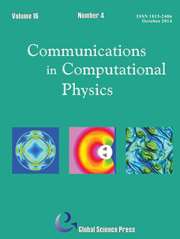Crossref Citations
This article has been cited by the following publications. This list is generated based on data provided by
Crossref.
Alami, Jones
2013.
Enhanced ionized sputtering in HIPIMS.
Vakuum in Forschung und Praxis,
Vol. 25,
Issue. 5,
p.
19.
Alami, J.
Maric, Z.
Busch, H.
Klein, F.
Grabowy, U.
and
Kopnarski, M.
2014.
Enhanced ionization sputtering: A concept for superior industrial coatings.
Surface and Coatings Technology,
Vol. 255,
Issue. ,
p.
43.
Djebali, Ridha
ElGanaoui, Mohammed
Jaouabi, Abdallah
and
Pateyron, Bernard
2016.
Scrutiny of spray jet and impact characteristics under dispersion effects of powder injection parameters in APS process.
International Journal of Thermal Sciences,
Vol. 100,
Issue. ,
p.
229.
Dietze, Elisabeth M.
and
Plessow, Philipp N.
2018.
Kinetic Monte Carlo Model for Gas Phase Diffusion in Nanoscopic Systems.
The Journal of Physical Chemistry C,
Vol. 122,
Issue. 21,
p.
11524.
Evrard, Martin
Besnard, Aurelien
and
Lucas, Stephane
2019.
Study of the influence of the pressure and rotational motion of 3D substrates processed by magnetron sputtering: A comparative study between Monte Carlo modelling and experiments.
Surface and Coatings Technology,
Vol. 378,
Issue. ,
p.
125070.
Kim, Yeon Soo
Chung, Harry
Kwon, Suhyoun
Kim, Jihyun
and
Jo, William
2022.
Grain boundary passivation via balancing feedback of hole barrier modulation in HfO2-x for nanoscale flexible electronics.
Nano Convergence,
Vol. 9,
Issue. 1,
Sabavath, G. K.
Swaroop, R.
Singh, J.
Panda, A. B.
Haldar, S.
Rao, N.
and
Mahapatra, S. K.
2022.
Study of Plasma Parameters and Deposition Rate of Titanium Thin Film in a DC Magnetron Sputtering Method.
Plasma Physics Reports,
Vol. 48,
Issue. 5,
p.
548.
Thanasriswad, Pawarun
Sakdanuphab, Rachsak
Sakulkalavek, Aparporn
and
Worananthakij, Worakrit
2023.
Effects of Ag-doped Content on Antimicrobial Activity and Substrate Color of Chromium Thin Films Deposited by DC Magnetron Sputtering.
CURRENT APPLIED SCIENCE AND TECHNOLOGY,
p.
e0255965.
Hata, Shotaro
Nakano, Yutaro
Narishige, Ryota
Okumura, Takamasa
Kamataki, Kunihiro
Koga, Kazunori
Shiratani, Masaharu
and
Itagaki, Naho
2025.
Sputter epitaxy of ZnO–InN alloy films on sapphire substrates realized via 3D buffer layers and kinetically driven growth control.
AIP Advances,
Vol. 15,
Issue. 9,

